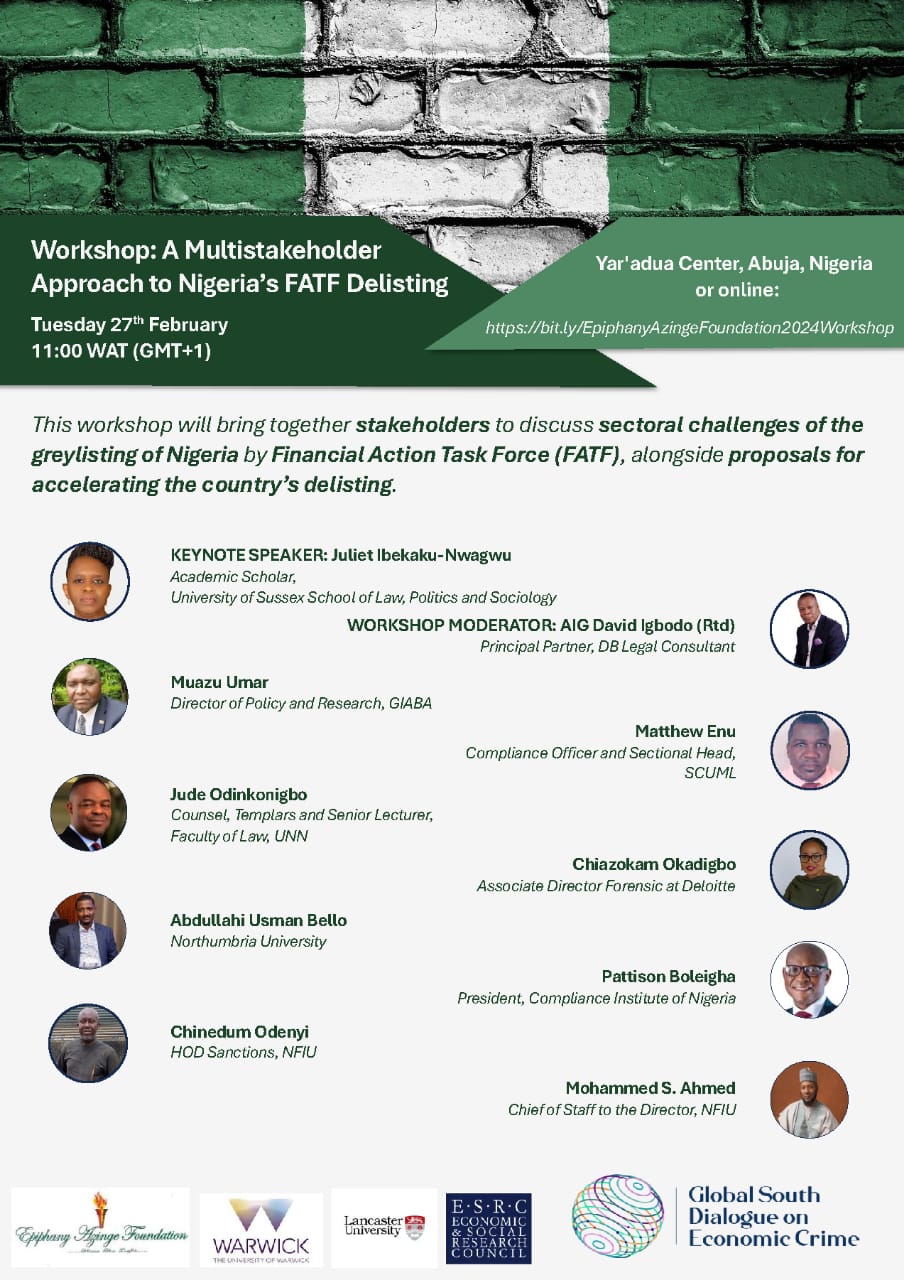Workshop: A Multistakeholder Approach to Nigeria’s Financial Action Task Force (FATF) Delisting

EVENT DETAILS
On 24 February 2023, the Financial Action Task Force (FATF) greylisted Nigeria owing to significant deficiencies in the country’s anti-money laundering and counter-terrorism financing (AML/CFT) efforts. When a country is placed on the FATF’s greylist, it implies that it is under increased monitoring due to strategic deficiencies identified in its regime’s ability to combat money laundering and terrorist financing (ML/TF), and the country has committed to addressing its challenges.
The FATF is an inter-governmental standard-setting body that develops and promotes AML/CFT recommendations which countries must implement and comply with. Arguably, the FATF’s standards are developed on two fronts: prevention and enforcement. While the former is focused on regulation, supervision, reporting and customer due diligence, the latter is designed to be punitive and centers on investigation, confiscation, prosecution, and sanctions. To determine how countries comply with the FATF’s standards and effectiveness outcomes, the FATF conducts periodic mutual evaluations. Under the oversight of the FATF’s International Cooperation Review Group (ICRG), countries are reviewed based on the risk they present to the international financial system. Prompts for review are where:
- A country fails to participate in an FATF style regional body (FSRB) or hinders the timely publication of its mutual evaluation report.
- Is nominated by an FATF member or FSRB based on specific risks or threats; or
- Has achieved poor results on its mutual evaluation, especially where it has 20 or more non-compliant (NC) or partially compliance (PC) ratings for technical compliance or it is rated NC/PC on three or more of the big six (6) recommendations (3,5,6,10,11 and 20).[1] Where a country has low effectiveness on its immediate outcomes, its likelihood of being reviewed is high.
Countries are not automatically greylisted due to the ICRG’s review process. Instead, they are placed on a one-year observation period during which they are to address their strategic deficiencies with the aid of an action plan and high-level political commitment towards reform. Greylisted jurisdictions are those working with the FATF to address their strategic deficiencies. Countries that fail to improve their deficiencies can be blacklisted, a list that calls on other countries to apply countermeasures to protect the international financial system.
Nigeria is at cross-roads where it could be delisted or potentially blacklisted. In May 2022, prior to being greylisted, Nigeria had 26 recommendations rated Compliant or Largely Compliant, but lagged on the others. Among the identified challenges were a lack of understanding regarding the national risk assessment, ineffective local and international inter-agency cooperation, poor AML/CFT investigations and prosecutions, and inadequate oversight of designated non-financial businesses and professions (DNFBPs). Indeed, while Nigeria has made commendable strides in addressing a significant aspect of its action plan, the persistence of its greylisted status could severely impede its economic development trajectory. Addressing the challenges requires a multifaceted approach that unearths the views from within to solve our local challenges.
Over the last three years, the Global South Dialogue on Economic Crime (GSDEC) has examined the compliance trajectory of countries with the FATF’s standards, the variables that influence compliance alongside the potential unintended consequences of erroneous transplantation. In partnership with the Epiphany Azinge Foundation, we are hosting this workshop to convene stakeholders to examine why Nigeria is greylisted while also interrogating proposals for accelerating the country’s delisting. As a result, this stakeholder-focused workshop will provide critical insights into the implications of the country’s greylisting while working to strengthen the capacity of key stakeholders to successfully implement the FATF’s AML/CFT regime.
[1] Therefore four possible level of technical compliance: Compliant (C ), Largely Compliant ( LC ), Partially Compliant (PC) and Non-Compliant ( NC).
Watch the workshop impact video HERE.
The Global South Dialogue on Economic Crimes Network seeks to advance dialogue, research, and capacity on economic and financial crimes
